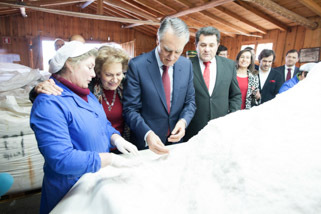
I had the privilege of being acquainted with Nelson Mandela, probably one of the greatest statesmen of the 20th century.
When he came to Lisbon, in 1993, we had a lengthy meeting together, followed by luncheon, in S. Bento, jointly with other persons.
We commented on the pacific dismemberment of apartheid, on the transition of South Africa to a multiracial democracy, on the understanding he had established with the then President of the Republic Frederik De Klerk, and on the civil wars in Angola and Mozambique. We spoke about the Portuguese Community in South Africa. Nelson Mandela was, in 1993, very optimist as to the future of South Africa.
He thanked me for the support provided by Portugal for his liberation and for that of other political prisoners. He thanked me for the support provided by Portugal towards South Africa’s pacific transition to a multiracial democracy.
Nelson Mandela was familiar with Portugal’s positions and with my own positions in the European Union.
In 1987, I had written to the then President of the South African Republic, Mister Pieter Botha, asking for the liberation of Nelson Mandela. I believe the bearer was Dr. Durão Barroso.
The President of the Republic of South Africa reacted very badly to that letter of mine. Relations between the two governments became somewhat tense. His answer was not very amiable.
Later, in 1988, Pieter Botha travelled to Lisbon, to have a meting with me. The meeting ran very badly and under heavy tension, precisely because Portugal strongly insisted on the liberation of Nelson Mandela and other political prisoners.
But the man who made the turnaround that allowed Mandela’s liberation and the end of apartheid was Frederik De Klerk. I believe I was the first European Leader that received De Klerk after he announced his candidacy for President of the Nationalist Party and President of the Republic of South Africa.
He came to Lisbon in 1989 to hold a meeting with me. He was not yet President of the Republic, but just Minister for Education. And he then told me: “If I am elected I will free Nelson Mandela”. And so he did. He came to Lisbon twice more, as President of the Republic, to hold talks with me. We often spoke on the telephone, and we became friends, such that when we left our offices in government, we continued meeting. He came to Lisbon to see me more than once. We even met in London.
From that time onward, Portugal defended President De Klerk in the midst of the European Union. I recall several meetings with other Prime Ministers, stating “This is the man we must support, since he is the man who will liberate Nelson Mandela and other political prisoners and put an end to apartheid”
It wasn’t easy. There was great scepticism in the European Union as to De Klerk’s capability to carry out changes in South Africa.
But Portugal insisted, and my then colleagues, Prime Ministers, came to understand that it was necessary to support De Klerk.
He even faced a referendum of the white community, who wanted to remove him as President of the Republic since he was negotiating with the ANC.
I clearly recall the many telephone conversations we then held, and the support I provided to De Klerk.
I took part in probably more than ten European Council Meetings where we discussed the liberation of ANC prisoners and the transformation of South Africa into a multiracial democracy.
Portugal always kept an unambiguous position. Portugal was always against, but always against, armed fighting, as later on Nelson Mandela clearly asserted. When he was with me in Lisbon he stated: “I am against violence. I am against armed fighting. I defend reconciliation and dialogue”. And Portugal was clearly against armed fighting. Because, alongside, we had the civil war in Angola. And. on the other coast, the civil war in Mozambique. And another civil war in South Africa would mean conflagration in the whole of Southern Africa.
And who would suffer? Not just the four hundred thousand Portuguese who lived in South Africa. But the poorest Negro populations in South Africa would also be sufferers. Portugal was also against armed fighting, well knowing that it would lead to conflagration in all of Southern Africa.
And one of the talks I held with Nelson Mandela was precisely how to bring to an end the civil wars in Angola and Mozambique.
Thus my great comfort in seeing Mandela clearly thanking Portugal for always having held a position of coherence, of dialogue, of reconciliation, but against violence.
He often underlined, during this long meeting we held, and during luncheon: “I do not want violence, thus my understanding with Frederik De Klerk”.
What we must retain, particularly in this moment, is that Nelson Mandela was one of the greatest statesmen in the world. A man with great political courage, with great humane qualities, who defended commitment, dialogue and reconciliation, and who abjured armed war and opposed violence. He was an enormous example to everyone in the world.
And, for this reason, we pay a greatly deserved tribute to the man whom, I believe, was one of the greatest statesmen in the 20th century.
© 2006-2016 Presidency of the Portuguese Republic
You have gained access to the records of the Official Site of the Presidency of the Republic from 9 March 2006 to 9 March 2016.
The contents available here were entered in the site during the 10 year period covering the two mandates of President of the Republic Aníbal Cavaco Silva.